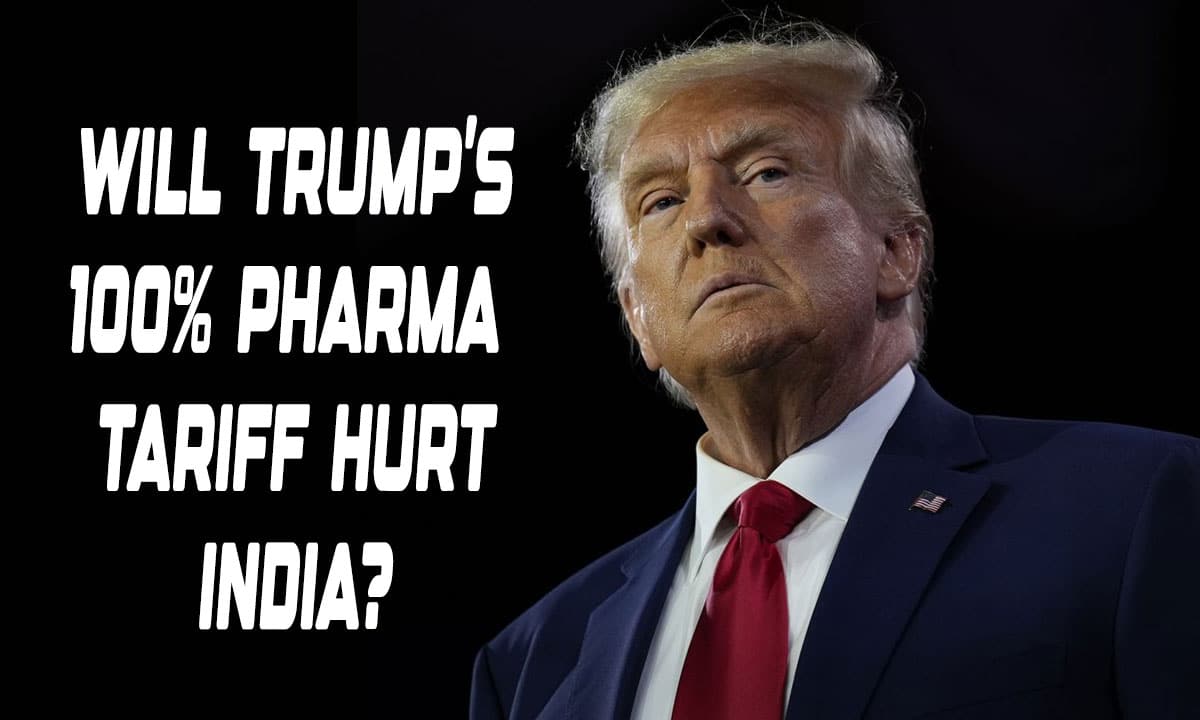Will Trump’s 100% Pharma Tariff Hurt India’s Exports or Spare Generic Makers? Here’s What Experts Say
US President Donald Trump's move to impose 100 per cent import tariffs on pharmaceutical drugs from October 1 is unlikely to have an immediate impact on Indian exports

New Delhi: US President Donald Trump’s move to impose 100 per cent import tariffs on pharmaceutical drugs from October 1 is unlikely to have an immediate impact on Indian exports, as it will affect only patented and branded products, not generic medicines, pharma industry players said on Friday.
Indian Pharmaceutical Alliance (IPA), which represents 23 leading Indian pharmaceutical firms, including Dr Reddy’s Laboratories, Sun Pharma, Lupin, and Zydus Lifesciences, noted that Trump’s latest tariff will not have implications for the generic drugmakers.
In his post on social media platform Truth Social, Trump wrote, “Starting October 1st, 2025, we will be imposing a 100% Tariff on any branded or patented Pharmaceutical Product, unless a Company IS BUILDING their Pharmaceutical Manufacturing Plant in America.”
Also Read: Domestic generic producers may see near-term gains as US imposes tariffs on pharma
The US President further clarified, “IS BUILDING” will be defined as “breaking ground” and/or “under construction.” There will, therefore, be no Tariff on these Pharmaceutical Products if construction has started.”
Reacting to the development, IPA Secretary General Sudarshan Jain said in a statement, “It does not apply to generic medicines.”
Trump’s statement refers to patented and branded products supplied to the US, he added.
Indian pharma companies largely export generics to the US market.
Together, IPA members drive more than 80 per cent of India’s drug and pharmaceutical exports, and serve over 64 per cent of the domestic market.
Pharmexcil Chairman Namit Joshi said, “India has long been a cornerstone of the global supply chain for affordable, high-quality medicines, supplying nearly 47 per cent of the US’s pharmaceutical requirements.
“The proposed 100 per cent tariff on branded and patented pharmaceutical imports is unlikely to have an immediate impact on Indian exports, as the bulk of our contribution lies in simple generics and most large Indian companies already operate in the US. Manufacturing or repackaging units and are exploring further acquisitions,” he said.
Looking ahead, India will need to reinforce its cost-efficiency advantage in bulk drugs and APIs — an area where the US is likely to favour India over other suppliers — and simultaneously invest in next-generation opportunities such as complex generics, peptides, biosimilars, and CAR-T therapies, Joshi said.
“Generics will remain relevant but will gradually mature; optimising costs and capabilities in these emerging categories will shape the next phase of growth,” he added.
Emcure Pharmaceuticals also said the tariffs will have no impact on it as it has limited exposure to the US market (less than 5 per cent) and no exposure for branded and patented drugs in the country.
Indian pharmaceutical companies supply a substantial proportion of drugs to US residents, with four out of ten of all prescriptions filled in the US in 2022 being supplied by Indian companies.
As per industry sources, overall, medicines from Indian companies provided USD 219 billion in savings to the US healthcare system in 2022 and a total of USD 1.3 trillion between 2013 and 2022.
Generics from Indian companies are expected to generate an additional USD 1.3 trillion in savings over the next five years.
Icra VP & Sector Head (Corporate Ratings) Deepak Jotwani said branded and patented drug imports are not expected to have any material immediate impact on the Indian pharmaceutical industry.
India’s strength lies in generic drug exports, which are exempt from these tariffs, he added.
“However, few Indian pharma companies with exposure to non-US domiciled branded formulation/ innovator drug companies, who in turn export to the US, by way of sales of APIs or intermediates to them or undertaking contract manufacturing, may face headwinds,” he noted.
Echoing similar sentiments, Founder and Director at Foundation for Economic Development, Rahul Ahluwalia, said India’s main exports are generics, so the immediate impact should not be very high, but this is a troubling sign for the future development of the pharma industry in India.
“We should redouble efforts to get a trade deal with the US and EU to enable our industries to have access to large markets,” he added.
Head of Asia Economics at Oxford Economics, Louise Loo, said Asia supplies just over 20 per cent of US pharmaceutical imports by value, a meaningful commercial hit for US consumers at face value.
“We, therefore, expect the US to follow up with announcements detailing protections for some categories of products, blunting the effective tariff burden,” she added.
The pharmaceutical sector, India’s largest industrial export, was estimated at USD 12.72 billion in 2024.
